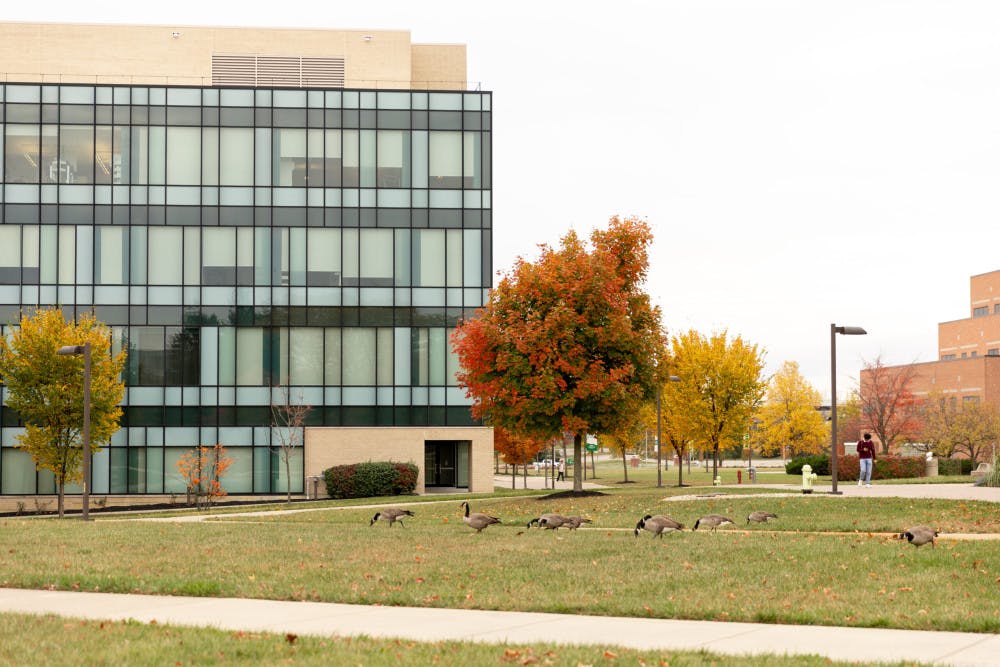Geese on Campus | Photo by Bethany Althauser | The Wright State Guardian
Provost Amy Thompson sent out an announcement addressing the deactivation and immediate suspension of 34 programs at Wright State University on Feb. 15, 2024. The university has since created degree plans, guaranteeing that students currently enrolled in deactivated programs will not be negatively affected.
Background information
Last June, the Office of the Provost was charged with conducting a review to determine the effectiveness and efficiency of WSU academic programs.
The Academic Efficiency and Effectiveness Review aids in determining the usefulness of current programs at WSU. Through the conduction of this review, WSU found a total of 34 programs that needed to be deactivated due to low demand.
The provost stated the importance of focusing on programs in high demand for WSU’s sustainability.
“By reducing low-demand programs, the Academic Efficiency and Effectiveness Review process allows Wright State to redirect its efforts to improve, maintain and expand programs that have shown significant demand and relevance in today's job market,” the provost said.

Thompson announced the deactivation and suspension of numerous WSU programs, which had been in the works for much longer.
Of the 34 programs, 22 were already in the process of being deactivated.
The deactivation covers programs from many different colleges at WSU from both the Dayton and Lake campus. Admission to programs ranging from those in the College of Science and Mathematics, Liberal Arts, Engineering and Computer Science and more has been immediately suspended.
A list of all programs being deactivated has been provided by the university for students and the community.
The deactivation and suspension of a lengthy list of programs may appear drastic, but the provost stressed the importance of suspending these programs for the university to focus on other programs and maintain excellence.
“These changes present opportunities for innovation and reinvigoration of our collective work and commitment to empowering our students to excel in their lives and chosen careers,” Thompson said.
Academic efficiency and effectiveness review
The deactivation and immediate program suspensions were initiated by the Academic Efficiency and Effectiveness Review Committee and rolled out university-wide.
At the college level, a review assessing the effectiveness and efficiency of a program is meant to be undertaken each year. This helps WSU keep track of programs that serve less purpose to the majority of students and ensure that resources are being properly allocated to programs with high enrollment.
The entire process of the review consists of several steps which must be completed on a specific timeline.
This review began Dec. 8, 2023, with the completion of program review activities ending Feb. 16, 2024, when the Board of Trustees held a meeting to review final recommendations.
A review of such importance is very thorough to allow for continued feedback and ensure that the review is aligning with the original purpose.
The Review Committee considered four key questions upon collection and examination of programs. These questions evaluate if the programs align with the mission of WSU, produce an outcome of quality, uphold a demand in the market and produce fiscally efficient margins.
Additionally, each program is then put into one of four categories. The programs may fall into categories with an outcome pertaining to enhancement, maintenance, improvement or closure.
Dr. Subhashini Ganapathy, a member of the Review Committee and Faculty Senate, explained the intentions behind program reviews.
“Usually, we constantly aim to optimize resources, enhance student education, maintain high-quality educational standards for our students, and so, we periodically assess programs at both departmental and college levels,” Ganapathy said.
Information on the process of deactivation has been available to the public, yet many question the plan for students currently enrolled in these programs.
Individualized plans
WSU has made sure that students currently enrolled in any of these programs will be given proper guidance to ensure that the completion of students’ degrees will not be affected.
“Students in deactivated programs were contacted by their academic colleges and received individual plans like this, created in conjunction with their department chair and academic advisor, to complete their programs to ensure timely completion,” Thomspon said.
Thompson refers to a “Wright State University Degree Planning Worksheet.” The worksheet requires students to provide academic information to the advisor.
The degree plans sent by academic advisors allow students to thoroughly plan out academic scheduling. This entails documenting required courses that the student has taken, courses relating to the students’ major, a plan of study for each term and additional student information.
Collecting this information aided academic advisors in correctly creating a plan for students, which will eliminate any setbacks in the way of the student’s path to excellence.
Incoming WSU students interested in enrolling in any of the 34 deactivated classes are said to receive assistance in degree planning as well.
The university understands that this change may appear stressful and has made efforts to create a smooth transition for those involved through these individualized plans.
WSU says it remains dedicated to continuing the improvement of programs that allow students to receive optimal education while enhancing the quality of the university.











